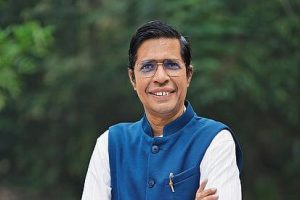Investing in digital infrastructure, research, and a technology-driven education system is crucial to realising the vision of a ‘Viksit Bharat 2047’ and shaping India’s future as a developed nation, said Prof Veezhinathan Kamakoti, Director, IIT Madras at AIMA’s LeaderSpeak session.
As we envision India as a knowledge and technology superpower, it’s essential to build a society rich in culture, inclusivity and prosperity, a ‘Viksit Bharat’. We need to develop a self-reliant India, that reflects our diverse identity, rooted in our heritage while embracing innovation. To realise this, it’s crucial for us to create an environment where every individual has the freedom to thrive in their unique capabilities, with the right education and opportunities.
As an educationist, policymaker, and head of a premier institution, I often reflect on what is expected of me and my institution in contributing to this vision. One fundamental expectation is to ensure that we preserve India’s identity and culture while enabling progress in a rapidly changing world. It is our responsibility to create an educational framework that respects our traditions, yet empowers future generations to explore, innovate, and lead in global arenas.
As we move towards the goal of ‘Viksit Bharat 2047’, we must also prioritise preserving our roots. Our children must be given the freedom to pursue their interests, explore their passions, and carve their own paths. This requires a fundamental shift in how we approach education. It is not just about rote learning or following a rigid curriculum but about nurturing curiosity, creativity, and independent thinking.
One of the major reforms in this direction is the National Education Policy (NEP) 2020. The NEP encourages holistic learning, moving away from traditional methods that focused on memorisation and uniformity. It promotes an inclusive, flexible education system that allows students to explore multiple disciplines simultaneously. For example, the University Grants Commission has approved the possibility of pursuing two degrees at the same time, provided there’s no timetable clash. This flexibility has been extended to online education, where students can pursue a degree during the day and another in the evening.
At IIT Madras, we’ve embraced this vision with our online Bachelor of Science (BS) programs in Data Science and Electronic Systems. With over 35,000 students enrolled, this initiative exemplifies how we can democratise education and reach students from all backgrounds. This is a significant step towards ensuring that every student, regardless of location or background, has the opportunity to access quality education and develop skills for the future.
Creativity and innovation thrive when children are encouraged to explore their interests freely. Unfortunately, our education system often forces a premature decision on students at the 10th grade, asking them to choose between science, commerce, or arts. This decision, made based on a single exam, often feels irreversible, locking students into predetermined career paths. This practice stifles creativity and discourages exploration. We need to rethink this approach and provide more opportunities for students to discover their true passions without being bound by early, rigid choices.
While India has vast potential, the key challenge lies in converting this potential into large-scale innovation. We are on the right track, but we need to ensure that the momentum is sustained. By fostering an education system that encourages exploration, creativity, and interdisciplinary learning, we can enable our youth to contribute to the country’s growth and its journey towards becoming a ‘Viksit Bharat.’ Through these efforts, we can build a future where India stands as a beacon of innovation, culture, and prosperity on the global stage.
Watch the full session- https://www.youtube.com/watch?v=qRG3bXtUz8g&t=1473s




